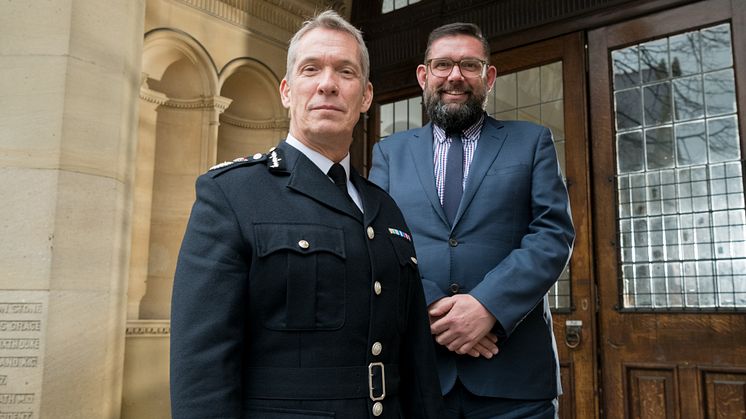
Press release -
Linguistics lessons for police “could catch more Dark Web paedophiles”
A new book shows how police forces can use forensic linguistics techniques to infiltrate online networks of child sex offenders to bring them to justice and protect potential victims.
A nationwide rollout of evidence-based linguistic training for undercover police officers could help them catch more paedophiles who target children online, a new book suggests.
In their highly detailed study, Language and Online Identities: The Undercover Policing of Internet Sexual Crime, forensic linguistic experts Dr Nicci MacLeod of Northumbria University and Professor Tim Grant of Aston University provide examples of how effective training can help covert officers infiltrate paedophile networks on the ‘Dark Web’ to identify victims and apprehend offenders.
This is particularly significant in the current context, as UK police forces lack a standardised and independently evaluated approach to training officers responsible for tackling online child sex offences.
Using a wealth of disturbing examples drawn from instant messaging chatlogs between suspected paedophiles and victims, as well as secretive Dark Web chatrooms and police training dialogues, the authors outline how child sex offenders create assumed identities to groom their victims, sometimes pursuing them using several different online personas.
The book also details the often shockingly explicit language used by offenders among themselves to share perverted fantasies, while simultaneously using code words and in-group references designed to show membership of the paedophile ‘club’ and flush out potential police infiltrators.
A key concept examined throughout is that of ‘identity performance’ – a term that captures how we construct identities based around our use of written language. The authors explain how it is possible to break free of these linguistic traits to imitate those of others convincingly.
They demonstrate how active training can help undercover officers to pose as either victims or fellow child sex offenders depending on the requirements of an investigation. This takes many forms, from mimicking the ‘text-speak’ style of interactions on instant messaging platforms to more complex techniques that allow police to blend in with online groups by making subtle references to aspects of their identity – such as gender, age, social class or familiarity with certain forms of English – that allow them to take on an authentic alter ego.
The book contains practical advice for police forces in training their own officers and using outside forensic linguistics experts to assist on investigations. Citing the successful example of the Pilgrim Course, a training programme run by West Midlands Police from 2010 to 2017, they show how officers can dramatically increase the success of their online infiltration techniques while remaining legally and ethically compliant.
In an evaluation of 2,700 minutes of training interactions, it was shown that undercover officers trained using the Pilgrim Course techniques cut their chances of being detected by adjudicators from 75% to 25%. It suggests officers trained in this way would stand a far greater chance of successfully infiltrating networks of child abusers.
In the latest year alone, 2.1 million indecent images of children were recorded in the UK’s Child Abuse Image Database (CAID), a national resource that helps the police and National Crime Agency identify victims and perpetrators of sexual abuse. From these, UK law enforcement identified 552 unique victims.
Dr Nicci MacLeod is a Senior Lecturer in English Language and Linguistics at Northumbria University, where she runs a Forensic Linguistics course as part of the English Language Studies and English Language and Literature BA programmes.
She also contributes to the Police Constable Degree Apprenticeships for both Northumbria Police and Durham Constabulary.
Her research focuses on investigative interviews with witnesses and suspects, with a particular interest in the experiences of female victims of gendered violence.
She said: “Forensic linguistics is an indispensable resource in efforts to improve the delivery of justice.
“Language analysis has a pivotal role to play at all stages of the investigative and judicial process, and we continue to work at demystifying language in these contexts to enhance access to justice for everyone.
“This book reports on one such way in which we have done so – by providing a firm evidence base, rooted in robust linguistic analysis, for the undercover policing of the online sexual exploitation of children.”
Professor Tim Grant is the UK’s only Professor of Forensic Linguistics, based at Aston Institute of Forensic Linguistics (AIFL). Last year, the Institute was awarded £5.5m of funding from Research England to establish an international centre of excellence for the study of forensic linguistics, which has a range of applications in fighting crime.
He said: “The use of forensic linguistics as a crime-fighting tool is about taking the lessons we learn in analysing language to increase the police’s chances of catching offenders and identifying and rescuing victims.
“There have been a number of high-profile cases in recent years where forensic linguistics has played a role in bringing offenders to justice - most notably the case of the Birmingham-based university researcher Matthew Falder, who was jailed for life in 2018 after admitting 137 serious child sex offences.
“The success of such operations very often depends on a nuanced understanding of linguistic techniques, to infiltrate the darkest corners of the ‘Dark Web’ in a convincing way that doesn’t arouse suspicion. What we show in our book is that it is possible to learn how to do this and that provides hope that police forces can improve their effectiveness in this area.”
Topics
Northumbria is a research-rich, business-focused, professional university with a global reputation for academic excellence. Find out more about us at www.northumbria.ac.uk --- Please contact our Media and Communications team at media.communications@northumbria.ac.uk or call +44 (0)191 227 4604 with any media enquiries or interview requests --- Our academic experts are available for interview via Globelynx, a down-the-line broadcast quality TV facility based at Northumbria's Newcastle campus. You can book the Globelynx connection at www.globelynx.com. The IFB number is 0191 603 1630.












